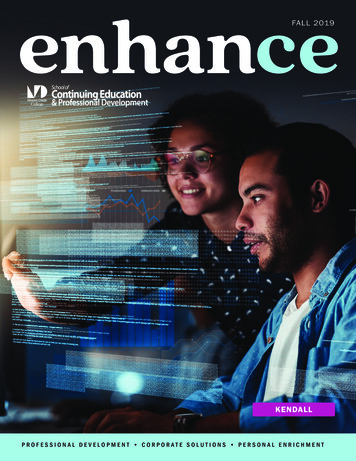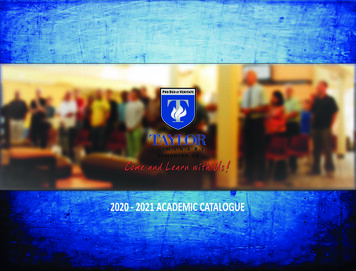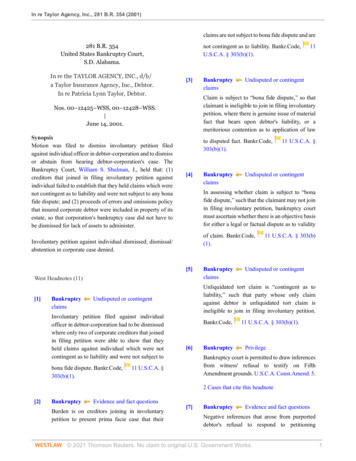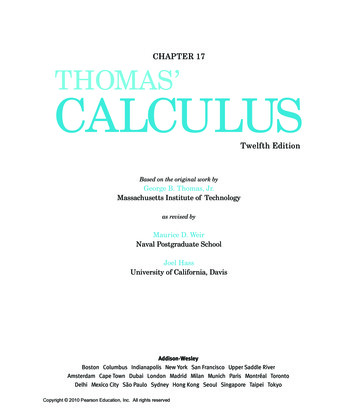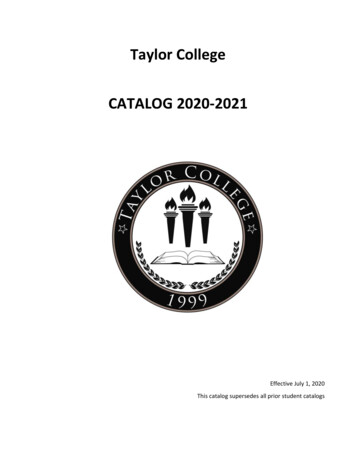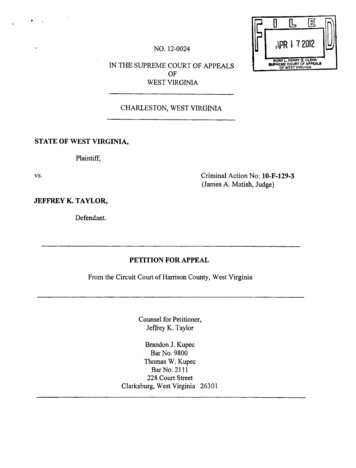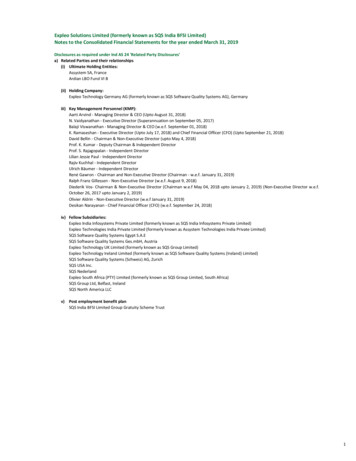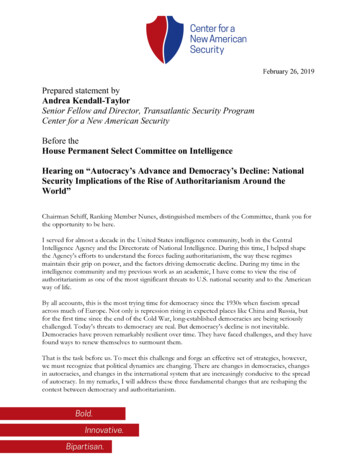
Transcription
February 26, 2019Prepared statement byAndrea Kendall-TaylorSenior Fellow and Director, Transatlantic Security ProgramCenter for a New American SecurityBefore theHouse Permanent Select Committee on IntelligenceHearing on “Autocracy’s Advance and Democracy’s Decline: NationalSecurity Implications of the Rise of Authoritarianism Around theWorld”Chairman Schiff, Ranking Member Nunes, distinguished members of the Committee, thank you forthe opportunity to be here.I served for almost a decade in the United States intelligence community, both in the CentralIntelligence Agency and the Directorate of National Intelligence. During this time, I helped shapethe Agency’s efforts to understand the forces fueling authoritarianism, the way these regimesmaintain their grip on power, and the factors driving democratic decline. During my time in theintelligence community and my previous work as an academic, I have come to view the rise ofauthoritarianism as one of the most significant threats to U.S. national security and to the Americanway of life.By all accounts, this is the most trying time for democracy since the 1930s when fascism spreadacross much of Europe. Not only is repression rising in expected places like China and Russia, butfor the first time since the end of the Cold War, long-established democracies are being seriouslychallenged. Today’s threats to democracy are real. But democracy’s decline is not inevitable.Democracies have proven remarkably resilient over time. They have faced challenges, and they havefound ways to renew themselves to surmount them.That is the task before us. To meet this challenge and forge an effective set of strategies, however,we must recognize that political dynamics are changing. There are changes in democracies, changesin autocracies, and changes in the international system that are increasingly conducive to the spreadof autocracy. In my remarks, I will address these three fundamental changes that are reshaping thecontest between democracy and authoritarianism.
1. Changes in democracy: Democracies are breaking down in new ways.Until recently, it was safe to assume that Western societies would be governed by moderate politicalparties and remain committed to liberal democratic values, open economies, and multilateralcooperation.1 We could also assume that respect for the core principles of free and fair elections,rule of law, human rights, and civil liberties were secure in a large and growing number of countries.Yet it is clear that these assumptions are no longer valid. Instead, factors such as globalization,migration, rising inequality, and stagnating living standards for broad swaths of citizens in Westerndemocracies are leading many to believe that democracy no longer works for them.Rising citizen dissatisfaction is fueling polarization and political divides. Information technologiesand social media amplify these fissures. While many authoritarian regimes are harnessing socialmedia to tighten their control, these same technologies are fraying the social bonds of democraticsocieties from within. The digital technologies that promise to connect people and enable a freeexchange of ideas are increasingly being used by populists and other extreme voices to amplify theirmessages. These dynamics have contributed to a decline in popular support for the political centerand fragmented politics across Europe. Such fragmentation is contributing to gridlock that threatensto undermine people’s support for democratic rule. The dysfunction that polarization andfragmentation breed also fuels Russian and Chinese narratives that democracy does not deliver.These trends in Western democracies are creating fertile ground for the rise of illiberal populism.Once in power, many populist parties pursue policies that slowly erode democracy from within.Today’s populist leaders have learned from earlier strongmen such as Venezuela’s Hugo Chávez,Russia’s Vladimir Putin, and Turkey’s Recep Tayyip Erdoğan, who incrementally undermineddemocracy. Such leaders assume power through relatively free and fair elections and subsequentlyleverage societal dissatisfaction to gradually undercut institutional constraints on their rule, sidelineopponents, and weaken civil society. Despite coming to power in different historical and culturalcontexts, their approach is the same: they stack key political institutions with loyalists and allies(particularly in the judicial and security sectors) and muzzle the media through legislation andcensorship. Their slow and piecemeal approach makes it difficult to pinpoint when democracyactually collapses.2The erosion of democratic rules and norms at the hands of democratically-elected incumbents, whatscholars refer to as “authoritarianization,”3 is a major change in the ways that democraticgovernments have traditionally collapsed. Until recently, coups have been the biggest threat toPippa Norris (2017). “Is Western Democracy Backsliding? Diagnosing the Risks.” Journal of Democracyweb %20Exchange%20-%20Norris 0.pdf.2 Nancey Bermeo (2016). “On democratic backsliding.” Journal of Democracy. 27(1), pp.5-19 and AndreaKendall-Taylor and Erica Frantz, “How Democracies Fall Apart: Why Populism Is a Pathway to Autocracy.”Foreign Affairs, December 5, 2016. /how-democraciesfall-apart.3 Barbara Geddes, Joseph Wright, and Erica Frantz (2018). How Dictatorships Work. Cambridge UniversityPress.12
democracy.4 From 1946 to 1999, 64 percent of democracies that collapsed did so via coups. In thelast decade, however, authoritarianization has been on the rise. Authoritarianization now accountsfor 40 percent of all democratic failures—a figure that is on par with the frequency of coups. Ifcurrent trends persist, authoritarianization will soon become the most common way thatdemocracies crumble and autocracies emerge.2. Changes in autocracy: Highly personalized autocrats are on the rise.Twenty-first-century autocrats are not the same as their Cold War predecessors. In the face of whatlooked like their inevitable extinction in the 1990s and early 2000s, dictators have changed theirstrategies. Today’s authoritarian regimes have become more resilient and a more formidablechallenge to democracy. Research shows that today’s authoritarian regimes last longer than theirpredecessors. From 1946 to 1989, the typical autocracy lasted 14 years. This number has nearlydoubled since the end of the Cold War to an average of 20 years. As authoritarian regimes becomesavvier and more durable, global democracy is likely to suffer.5Autocracies are evolving in a number of important ways. They have learned to mimic elements ofdemocracy, for example by regularly holding elections, allowing multiple political parties to exist, andproviding space for legislatures to function. They seek to portray themselves as upholders of the ruleof law, and then weaponize the system to weaken the opposition. And they have adapted to managethe threats initially posed by social media. Authoritarian regimes have co-opted these technologies todeepen their grip internally, curb basic human rights, spread illiberal practices beyond their borders,and undermine public trust in open societies. New advances in facial recognition and artificialintelligence will only intensify and accelerate these maleficent practices.Not only have the tactics of today’s autocrats evolved, but so too has their form. Since the end ofthe Cold War, highly personalized autocracies—those regimes where power is highly concentrated inthe hands of a single individual—are on the rise. As my colleagues Erica Frantz, Joseph Wright andI have shown, personalist dictatorships—or those regimes where power is highly concentrated in thehands of a single individual—have increased notably since the end of the Cold War. In 1988,personalist regimes comprised 23 percent of all dictatorships. Today, 40 percent of all autocraciesare ruled by strongmen.6The growing prevalence of personalized autocracies is cause for concern because they tend toproduce the worst outcomes of any type of political regime: they tend to produce the most risky andAndrea Kendall-Taylor and Erica Frantz, “How Democracies Fall Apart: Why Populism Is a Pathway toAutocracy.” Foreign Affairs, December 5, 2016. /howdemocracies-fall-apart.5 Andrea Kendall-Taylor and Erica Frantz (2015). “Mimicking Democracy to Prolong Autocracies” TheWashington Quarterly, 37:4 pp. 71–84.6 Andrea Kendall-Taylor, Erica Frantz, and Joseph Wright (2017). “The Global Rise of Personalized Politics:It's Not Just Dictators Anymore,” The Washington Quarterly, 40:1, 7-19 and Andrea Kendall-Taylor, EricaFrantz, and Joseph Wright (2016), “The New Dictators: Why Personalism Rules,” Foreign Affairs, September26, 2016, /new-dictators.43
aggressive foreign policies; the most likely to invest in nuclear weapons;7 the most likely to fight warsagainst democracies;8 and the most likely to initiate interstate conflicts.9 As the adventurism of Iraq’sSaddam Hussein, Uganda’s Idi Amin, and North Korea’s Kim Jong-un suggests, a lack ofaccountability often translates into an ability to take risks that other dictatorial systems simply cannotafford.Russia underscores the link between rising personalism and aggression. Although Putin’s actions inCrimea and Syria were designed to advance a number of key Russian goals, it is also likely thatPutin’s lack of domestic constraints increased the level of risk he was willing to accept in pursuit ofthose goals. Putin’s tight control over the media ensures that the public receives only the officialnarrative of foreign events. Limited access to outside information makes it difficult for Russians toaccess unbiased accounts of the goings-on in the rest of the world and gauge Putin’s success in theforeign policy arena. Putin’s elimination of competing voices within his regime further ensures thathe faces minimal accountability for his foreign policy actions.Politics in China show many of these same trends. Xi’s increasingly aggressive posture in the SouthChina Sea has occurred alongside the rising personalization of the political system. Xi has amassedsubstantial personal power since coming to office in 2012 and continues to roll back the norms ofthe post-Mao collective leadership system. If Xi further consolidates control and limitsaccountability—particularly over military and foreign policy bodies—research suggests that he, too,could feel free to further escalate his aggressive rhetoric and actions in the South China Sea.Not only do personalist dictatorships pursue aggressive foreign policies—they are also often difficultand unpredictable partners. Research underscores that, thanks to limited constraints on decisionmaking, personalist leaders generally have the latitude to change their minds on a whim, producingvolatile and erratic policies.10 Moreover, personalist leaders—think Putin, Bolivian President EvoMorales, and Venezuelan President Nicolás Maduro—are among those autocrats who are mostsuspicious of U.S. intentions and who see the creation of an external enemy as an effective means ofboosting public support. Anti-U.S. rhetoric, therefore, is most pronounced in personalist settings.Finally, personalist regimes are the most corrupt and the least likely to democratize. Strongmanautocracies, more so than any other type of government, depend on the distribution of financialincentives to maintain power.11 As such, these leaders are the most likely to squander foreign aid andsideline competent individuals, hollowing out those institutions that could plausibly constrain theirpower. Their departure from power often entails instability and violence. And they leave conditionsthat are highly inhospitable for a transition to democracy. Put differently, when leaders like TurkishChristopher Way and Jessica L. P. Weeks, “Making It Personal: Regime Type and Nuclear Proliferation,”58(3): pp. 705-719.8 Mark Peceny, Caroline Beer, and Shannon Sanchez-Terry (2002), “Dictatorial Peace?” American PoliticalScience Review 96(1): pp. 15-26.9 Jessica Weeks (2012), “Strongmen and Straw Men: Authoritarian Regimes and the Initiation of InternationalConflict,” American Political Science Review 106(2): pp. 326-347.10 Erica Frantz and Natasha Ezrow (2011). The Politics of Dictatorship: Institutions and Outcomes inAuthoritarian Regimes. Lynne Rienner.11 Joseph Wright (2010). “Aid Effectiveness and the Politics of Personalism” Comparative Political Studies43(6): pp. 735-762.74
President Erdoğan roll back democracy and consolidate personal power, the effects of their actionspersist long after they exit office.3. Changes in the international system: China’s rise and Russian assertiveness threatendemocracy.In addition to changes taking place within democracies and authoritarian regimes, there are tectonicshifts in the international environment that are creating conditions more conducive to the spread ofautocracy. As Western democracies are increasingly distracted with their own domestic challenges,authoritarian regimes—especially Russia and China—have grown more assertive on the global stage.Russia and China are convinced of the threat of Western-backed revolutions and have responded byadapting their survival tactics and exporting their best practices for guarding against the “threat” ofengagement with the democratic West. Russian and Chinese efforts to counter democracypromotion are not new. But they have changed in scope and intensity. Since 2014, Russia inparticular has gone on the offensive with its efforts to undermine Western democracies. BecauseMoscow and Beijing gauge their power in relation to the United States, they view weakeningWestern democracy as a means of enhancing their own standing.12Shifts in geopolitical power are increasing the potency of Russian and Chinese actions. China’s riseand Russia’s assertiveness provide other leaders with examples of viable alternatives to the West andalter perceptions about what constitutes a legitimate regime. In recent years, China in particular hassought to portray itself as a compelling alternative to democracy. According to the World Bank,China’s GDP growth has averaged nearly 10 percent a year since 1978—the fastest sustainedexpansion by a major economy in history—and has lifted more than 800 million people out ofpoverty.13 Many now view China as demonstrating that the road to prosperity no longer needs to runthrough liberal democracy. Even without a deliberate strategy to export his model of governance,Putin has offered a model that others seek to emulate. Hungarian Prime Minister Viktor Orbán andTurkish President Recep Tayyip Erdoğan, for example, seem to admire Putin’s strongman tacticsand have adopted elements of his repertoire to enhance their own control. This means thatprominent authoritarian powers can create conditions that are more conducive to autocracy evenwhen they do not proactively seek to promote a coherent alternative ideology. In other words,autocracies do not have to engage in “autocracy promotion” to weaken democracy.Beyond demonstration effects, a shift in the balance of economic and military power away from thedemocratic West is increasing the potency of the threat that countries such as Russia and China poseto democracy.14 Research shows that the structure of the international system—whether democraticor authoritarian powers are most dominant—directly explains how many democracies or autocraciesAndrea Kendall-Taylor and David Shullman, “How Russia and China Undermine Democracy: Can theWest Counter the Threat?” Foreign Affairs, October 2, cy13 World Bank, “The World Bank In China,” Text/HTML, World Bank, September 26, rview.14 Yascha Mounk and Roberto Stefan Foa, “The End of the Democratic Century,” Foreign Affairs, May/June2018 Issue.125
are present globally.15 When a single democratic country dominates the international system—as theUnited States did in the aftermath of the Cold War—the number of democracies in the world peaks.When autocracies gain in influence, as the Soviet Union was during the Cold War, the pendulumswings in the other direction and the number of autocracies rises. This research suggests that China’srising power and Russia’s assertiveness are creating conditions more conducive to the spread ofautocracy.Not only will the rising power and assertiveness of these countries pose a grave challenge todemocracy, but there is compelling evidence suggesting that relations between Russia and China aregrowing closer.16 China is now the largest importer of Russian oil, and China has surpassed Germanyas Russia’s most important trading partner. Beyond economics, evidence across a host of political,military, and diplomatic indicators demonstrate deepening ties. The Directorate of NationalIntelligence’s 2019 Annual Threat Assessment to Congress included a section on Russia-Chinarelations for the first time and warned of the potential that Russia and China “will collaborate tocounter U.S. objectives, taking advantage of the rising doubts in some places about the liberaldemocratic model.”17 The potential for Russia-China collusion and collaboration significantlyincreases the challenges to U.S. efforts to uphold democracy.Recommendations for preventing authoritarian resurgenceWhile it is true that democracy is still the most prevalent form of government in the world, currenttrends suggest that we may soon witness a disconcerting reversal. If democracies do not respond tothe contemporary challenges described above, autocracies may soon become the international norm.The world’s democracies must be proactive and cannot afford complacency.Efforts to prevent a widespread authoritarian resurgence must be broad, preemptive, andmultifaceted. The following recommendations are not exhaustive but outline several strategicapproaches that address the challenges stemming from changes inside democracies, insideautocracies, and in the broader international environment.1. Act early.The slow and gradual way that democracies today are backsliding makes “authoritarianization”difficult to counter. Because it is subtle and incremental, there is no single moment that triggerswidespread resistance or creates a focal point around which an opposition can coalesce. Althoughdifficult to navigate, early intervention is key because it raises the prospects that backsliding can behalted. Unlike leaders that seize power through coups, autocrats that gain control by alteringdemocratic processes seek to portray themselves as “democrats.” This makes them more sensitive toCarles Boix (2011). “Democracy, development, and the international system.” American Political ScienceReview, 105(4), pp.809-828 and Seva Gunitsky (2014), “From Shocks to Waves: Hegemonic Transitions andDemocratization in the Twentieth Century,” International Organization 68(3): pp. 561-597.16 See Graham Allison (2018), “China and Russia: A Strategic Alliance in the Making” The National InterestDecember 14, 2018, sia-strategic-alliance-making-38727.17 Daniel R. Coats, “Statement for the Record: Worldwide Threat Assessment of the US IntelligenceCommunity,” § Senate Select Committee on Intelligence 19-ATA-SFR---SSCI.pdf, p. 24.156
international and domestic criticism that highlights the inconsistency between their behaviors anddemocratic norms. Moreover, in these settings, civil society or opposition actors have probably notyet been fully disbanded. International attention may embolden such actors to take advantage of theremaining political space to mobilize and impede the entrenchment of autocracy.Early intervention is particularly important because the slow dismantling of democracy tends to giverise to highly personalized autocracies—the single most problematic regime type, as discussedabove. Data show that from 2000 to 2010, when democracies failed as a result ofauthoritarianization, a highly personalized autocracy emerged in 75 percent of cases. Most often,these populist strongmen rise to power with the support of a legitimate political party but are thenable to sideline competing voices. Russian President Putin, Venezuelan President Chávez, andTurkish President Erdoğan, for example, all came to power in this way.The U.S. Congress should work to institutionalize its response to the slow dismantling of democracyby identifying the early warning signs and specifying actions that raise the cost for leadersorchestrating the incremental erosion of executive constraints. Although the initial signs ofauthoritarianization can be ambiguous, comparative political science research has progressed inidentifying the signposts and indicators of this process. Working with the intelligence communityand subject matter experts, the U.S. government should develop an early warning framework. Such aframework would equip Congress to proactively engage with at-risk countries, condemn earlyundemocratic maneuvers, and clearly articulate the actions they are willing to take in response tosubsequent undemocratic moves.2. Increase financial support to strengthen executive constraints and corruption, and sustainengagement with strategically important democracies.Congress should maintain strong support for external democracy assistance. Although there is nodefinitive blueprint for how such funds should be directed, research suggests that actions thatstrengthen executive constraints are particularly important for safeguarding democracy. The creationand maintenance of alternative centers of power that constrain governing officials—including strongpolitical parties and representative assemblies, judiciaries, civil society, and the media—is particularlyimportant to assure the durability of democracy and prevent the personalization of politics.Focusing external assistance programs on combatting corruption will also be key. More so thanother regime types, highly personalized autocracies rely on the distribution of corruption to sustaintheir hold on power. Disrupting corrupt networks therefore can deprive repressive regimes of theresources they use to maintain control. Corruption is also a tool that countries such as Russia andChina use to gain international influence and their efforts to spread it weakens some actors’commitment to democracy. Congress should increase support for anti-corruption programs andensure that U.S. government agencies, including the intelligence community, are equipped to combatcorruption, including through the intelligence community’s relationships with foreign intelligenceservices.Not only should U.S. external support be used to strengthen executive constraints, but policymakersand congressionally-funded aid agencies must sustain their engagement with strategically importantdemocracies. Political science research shows that a democracy’s risk of breakdown declines7
sometime between 17 and 20 years after the onset of democracy. However, the research shows thata declining risk of coups is the primary factor driving down a country’s risk of democratic failurebeyond this time frame. The threat of “authoritarianization,” it turns out, does not diminish overtime. Congress should therefore identify strategically important democracies—whose size orlinkages with neighboring states would be most likely to affect an entire region—and sustainengagement, attention, and support for these countries.3. Maintain America’s competitive edge.Politics follows geopolitics; the maintenance of America’s power and influence will be critical for themaintenance of democracy across the globe, as discussed above. Sustaining America’s competitiveedge will require U.S. policymakers to be committed to and focused on two interrelated sets ofstrategies.First, the United States must seek to enhance the strength and resilience of democracy at home.When America’s house is in order, it sets a powerful example that other actors can emulate andaspire to. These efforts must be far-reaching, ranging from policies addressing the education systemto the workforce, the information environment to critical infrastructure, and inequality to campaignfinance reform.Legislation to manage the challenges stemming from technological change are likely to beparticularly important. Artificial intelligence and automation will create new opportunities, but theywill also exacerbate divisions between winners and losers by disrupting job markets and displacingworkers. If governments are unable to identify new services, sectors, and occupations to replace thejobs that automation and other technologies will eliminate—and to train workers to fill them—theforces that have fueled populism will continue to rise.Second, the Unites States Congress can help equip the United States to compete with China andother autocracies abroad. First and foremost, this will require that America embrace and strengthenits commitment to allies. The United States should be working with, not alienating, allies andpartners in Europe and the Indo-Pacific region to address Russian aggression and China’s rise. In astrategic competition with China, allies are among America’s greatest assets. They are a forcemultiplier for U.S. influence, and they help the Unites States to uphold and support democracyacross the globe. Only through close coordination and collaboration will the U.S. be able toeffectively address China’s coercive, unfair, and illegal trade and investment practices.Finally, the U.S. Congress must be mindful of U.S. policies and approaches that may inadvertentlypush Russia and China closer together. An overreliance on sanctions, for example, could increasethese actors’ sense of common cause, including by providing them with greater incentive to developmechanisms that would allow them to develop alternatives to the financial and trading channels thatgive U.S. sanctions enormous global weight.***We are living in a time of rapid change. We find ourselves facing challenges whose sources andscope we do not yet fully understand, and for which the answers are not yet clear. History suggests8
that it will be the democracies—and not the far more rigid authoritarian structures—that will havethe resiliency required to harness change into advancement. But to meet the challenges before us,democracies will need to develop new ideas, new paradigms, new approaches—and the leadership toexecute them—to maintain their competitive edge.9
BiographyAndrea Kendall-TaylorSenior Fellow and Director of the Transatlantic Security Program, Center for a NewAmerican SecurityAndrea Kendall-Taylor is a Senior Fellow and Director of the Transatlantic Security Programat the Center for a New American Security (CNAS). She works on national security challengesfacing the United States and Europe, focusing on Russia, populism and threats to democracy,and the state of the Transatlantic alliance.Prior to joining CNAS, Andrea served for eight years as a senior intelligence officer. From2015 to 2018, she was Deputy National Intelligence Officer for Russia and Eurasia at theNational Intelligence Council (NIC) in the Office of the Director of National Intelligence(DNI). In this role Andrea led the U.S. intelligence community’s strategic analysis on Russia,represented the IC in interagency policy meetings, provided analysis to the National SecurityCouncil, and briefed the DNI and other senior staff for White House and internationalmeetings. Prior to joining the NIC, Andrea was a senior analyst at the Central IntelligenceAgency (CIA) where she worked on Russia and Eurasia, the political dynamics of autocracies,and democratic decline.Andrea is an adjunct professor at Georgetown University’s School of Foreign Service. Herwork has been published in numerous political science and policy journals, including theJournal of Peace Research, Democratization, Journal of Democracy, Foreign Affairs, theWashington Post, the Washington Quarterly, and Foreign Policy.Andrea received her B.A. in politics from Princeton University and her Ph.D. in politicalscience from the University of California, Los Angeles. She was a Fulbright scholar inAzerbaijan and Kazakhstan, where she conducted dissertation research on oil and autocracy.10
6 Andrea Kendall-Taylor, Erica Frantz, and Joseph Wright (2017). "The Global Rise of Personalized Politics: It's Not Just Dictators Anymore," The Washington Quarterly, 40:1, 7-19 and Andrea Kendall-Taylor, Erica Frantz, and Joseph Wright (2016), "The New Dictators: Why Personalism Rules," Foreign Affairs, September
